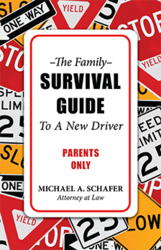Slow down! You are going to kill us! I can not believe that they allow you to drive! Once you get your license I’m never driving again. You are a hazard!
These and other comments are often shouted in fear as a parent is driving with their teen. Until a teenager earns a real driver’s license, a driver’s permit is issued, which is a new stage of life for the teen and a new phase of parenting for Parents. Adults often express anxieties about their teen drivers, and for good reason.
The Center for Disease Control and Prevention states that teen drivers who represent just 14% of the population are responsible for 30% of all accidents. In 2010 these accidents led to seven teen deaths each day. These teen drivers are three times more likely to be in fatal crash compared to drivers just a few years older.
It is clear that teen drivers are at greater risk, and yet this risk is shown to decrease with education and experience. Michael Schafer, a personal injury attorney out of Kentucky, has recently asked if the way we are going about educating our teens is effective. An example of current practices would be the Alive at 25 program which services six states. This program focuses on classroom instruction which increases driver awareness. However, curriculum such as this have been accused of using fear tactics to encourage safety but not effectively teaching how to drive safely.
Although telling teens of the dangers of driving is important to increase awareness, the teaching is more effective when the teen feels as though they are being spoken with rather than talked at by a bunch of adults. Schafer has created a unique book which corrects the way that teens are spoken to about their new responsibilities.
Schafer teamed up with his oldest daughter to create an innovative book about teen driving, which is a handbook for both parents and teens. Teens are expected to respond better to this book because his daughter, Rachel, wrote to her peers, and Mr. Schafer to their parents.
Mr. Schafer wanted to provide a book that spoke to the family as a whole in a world where current instruction is either for the parents or the teen, but not both. There is a section dedicated specifically to communication with your teen and with your parents, emphasizing that a new driver is a family affair.
Other sections of the book address getting the driving permit, taking the road test, after the license, teaching teens to drive, and buying the first car and insurance.
The book is meant to educate readers–readers, meaning not just teens, and not just adults. The dual perspective of this book aims to provide more comprehensible instruction.
We at Good Guys Injury Law encourage efforts like those of Mr. Schafer to increase the safety of our teens on the roads. Know that if your teen has encountered issues on the road or if you have had an issue with a teen driver we are here to help you (801)506-0800.
